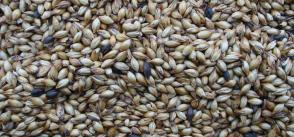
How Scientists Are Ensuring Syria’s Seeds Survive War and Climate Change
Between climate change and war, the Middle East’s agricultural history and diversity are under unprecedented threat. And the so-called “Doomsday Vault” in a frozen archipelago north of the Norwegian mainland will save it. That’s the hope at least, says Cierra Martin of the Global Crop Diversity Trust, who emphasized that we are “losing crop diversity every day” ahead of a recent deposit event at the Global Seed Vault in Svalbard, Norway, which saw thousands of new seeds deposited into the large storage vault in the ice for safe keeping. “Agricultural Armageddon” may seem hysterical, but with the myriad threats to our crop diversity—and therefore our environment and food security—from war, natural disaster, climate change, or heavy, single-variety commercial farming, it’s not such a far-fetched thought.
In war-torn Syria, the vault and the intricate system of seed banks that sit below it are already proving their worth as NGOs and partners salvage the seed supply and interrupt the control of populations by warring parties who use the food chain as a way of exerting power. This is done by implementing localized reproduction programs and small-scale farming projects in order to protect food security.
[Full article here | Photo by marcus_jb1973]







